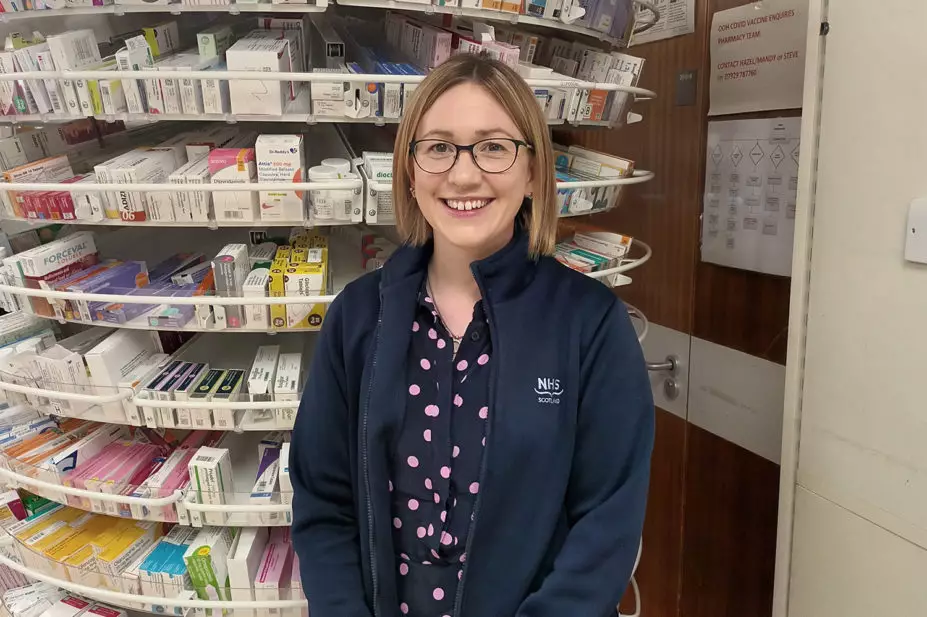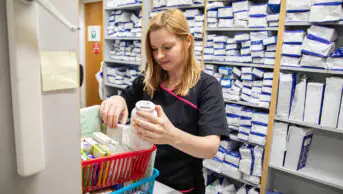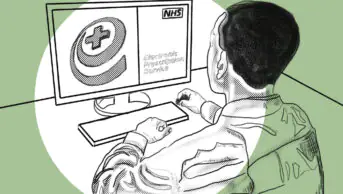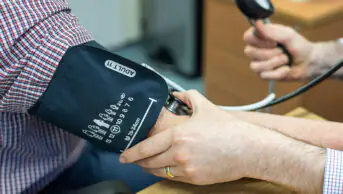
Lynne Merchant
Qualifying as an independent prescriber has led Lynne Merchant into areas she never expected, including reshaping patient pathways and enhancing communications with patients.
Merchant qualified as an independent prescriber in 2016 in London but now works in Scotland. Her background as a clinical pharmacist in hospitals — where she had to transcribe the medicines for discharge letters — meant moving to prescribing independently was a relatively small step, although writing out her first prescription was still a “huge” moment for her.
It is not necessarily how I imagined the role
As someone who had specialised in gastrointestinal diseases, she was asked to lead the switch to biosimilars within the gastroenterology department, a hands-on opportunity she relished. “I ended up doing the business case as part of the switch and I have never stopped,” she says. “It is not necessarily how I imagined the role.”
Merchant’s work involves a lot of contact with patients requiring infusions, ensuring that their condition is being monitored correctly and checking how they are reacting to a switch to biosimilars, as well as prescribing. She has worked to ensure treatment pathways are as smooth as possible, with any blood tests, for example, being scheduled at the optimum time and the process being made as patient-centred as possible.
It made me appreciate some of the other skills that I had never thought about as a clinical pharmacist, such as the softer skills
She has also started to work with a new group of patients — those who are receiving biologics at home but may need to come into hospital for blood tests. “It made me appreciate some of the other skills that I had never thought about as a clinical pharmacist, such as the softer skills. But it also made me very interested in health literacy,” she says.
With patients taking their medicines at home and without much regular contact, there was a need to ensure that they understood what they were being asked to do, including any monitoring. To do this, she introduced a structured medications review, involving a pharmacist and a consultant, for this group of patients and planned it into the patient pathway.
“These are very advanced therapies that we are prescribing for patients — they are high cost and high risk,” she says. “How do we share that with our patients as well? It is only the right treatment if it is a treatment our patients will take. Are we making sure our service does this?”
Questions such as this have led her to an interest in quality improvement, looking at how the service can improve and incorporating feedback from patients. This has produced initiatives, such as an information pack around monitoring for patients, and funding has been secured for information videos.
The team has been huge cheerleaders for what we have done
Merchant works within a multidisciplinary team which has encouraged and supported her to develop her practice, she says, and there is an atmosphere of mutual support and mentoring with other members of the team also becoming prescribers. “The team has been huge cheerleaders for what we have done. There has not been a barrier to what we want to do.”
The aim is to have pharmacists working at the top of their licences and the team has expanded, using “invest to save” principles (switching to biosimilars can offer significant savings).
And Merchant has no doubt that her work makes a difference to patients. Becoming an independent prescriber is “the single most important thing that has happened in my career. I would encourage any pharmacist thinking of becoming an independent prescriber to find a scope of practice. Peer support is really important as well. But I would say go for it — it makes such a difference to patient care”.
Quick fire questions
- How many prescriptions do you write? “About 20 a week.”
- Do you do more prescribing or deprescribing? “Prescribing.”
- Any regrets about qualifying? “Not one.”
- Favourite part of the working day? “I enjoy the virtual biologics clinic that I do.”
- How do you destress? “We have a very active wellbeing team in our department — we do lunchtime walks in the hospital grounds. More generally, just getting out and enjoying the countryside.”
- What makes your heart sink? “Just knowing the challenges that people are going through.”
- What makes your heart sing? “The leadership and helping others to progress, and just seeing people having that joy in work.”
Click here to return to: ‘Meet the prescribers: pharmacists transforming care for patients’


